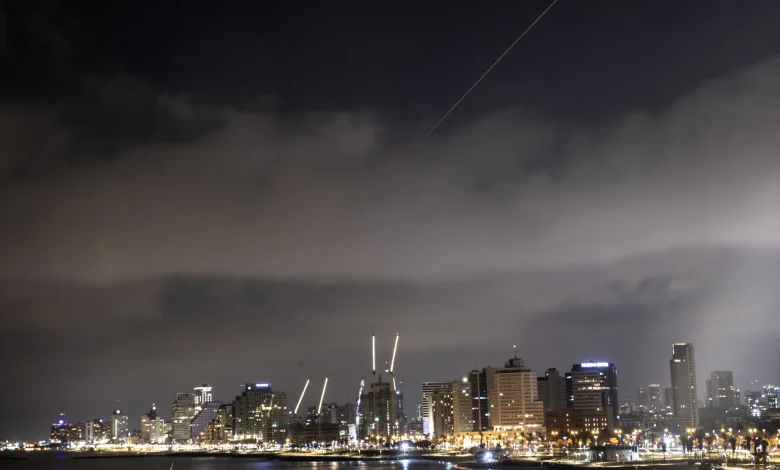Iran Attack Israel: A Geopolitical Flashpoint

The ongoing tension between Iran and Israel continues to be a major focal point in the Middle East, with potential ramifications on a global scale. The longstanding enmity between these two nations has seen periods of covert operations, diplomatic battles, and direct confrontations. Recently, the possibility of an Iranian attack on Israel has become a subject of intense speculation, raising concerns about a broader conflict in the region.
Historical Context of Iran-Israel Relations
To understand the gravity of a potential Iran attack on Israel, it’s essential to explore the history of their conflict. Prior to the 1979 Iranian Revolution, the two nations shared diplomatic ties, with Iran even recognizing Israel in 1950. However, after the revolution, the new Iranian leadership, under Ayatollah Khomeini, severed all ties and adopted a fiercely anti-Israel stance. This ideological shift led to Iran’s support for various groups hostile to Israel, including Hezbollah and Hamas.
Iran’s leadership has consistently condemned Israel, often calling for its destruction. This rhetoric has escalated over the years, feeding into the fears of a direct military confrontation. Despite the absence of direct warfare, proxy conflicts between the two nations have become a frequent occurrence, with both sides targeting each other indirectly in Syria, Lebanon, and Gaza.
Nuclear Ambitions and Israeli Concerns
A critical component of the ongoing Iran-Israel conflict revolves around Iran’s nuclear program. Iran’s pursuit of nuclear capabilities has been a persistent source of concern for Israel. While Iran insists that its nuclear program is for peaceful purposes, many nations, including Israel, believe that Tehran is covertly developing nuclear weapons.
Israel has vowed that it will never allow Iran to become a nuclear-armed state. This policy was explicitly stated by Israeli Prime Minister Benjamin Netanyahu and has led to repeated Israeli military operations targeting Iranian nuclear facilities. One of the most prominent operations was the Stuxnet cyber-attack, allegedly orchestrated by Israel and the United States, which temporarily disrupted Iran’s nuclear ambitions.
In recent years, tensions have flared over Tehran’s nuclear program after the U.S. withdrawal from the 2015 Iran nuclear deal, formally known as the Joint Comprehensive Plan of Action (JCPOA). The JCPOA was intended to curb Iran’s nuclear capabilities in exchange for sanctions relief. However, after the U.S. pulled out, Iran resumed its nuclear activities, sparking renewed fears of a potential conflict with Israel.
The Risk of Direct Confrontation
The possibility of an Iranian attack on Israel has always loomed in the background of their fraught relationship. Iran has developed and tested various long-range missiles capable of reaching Israel, which, combined with its support for regional militias, could pose a significant threat.
Iran’s Islamic Revolutionary Guard Corps (IRGC), a powerful military force within Iran, has been instrumental in advancing Tehran’s influence across the region. The IRGC’s Quds Force, responsible for external operations, has worked to solidify alliances with proxy groups like Hezbollah, which is stationed in Lebanon and poses a significant threat to northern Israel.
Israel, on the other hand, maintains one of the most advanced military forces in the world, with robust missile defense systems such as the Iron Dome, David’s Sling, and the Arrow system. These systems are designed to intercept incoming rockets and missiles, providing Israel with a defensive advantage. Nonetheless, the sheer volume of potential rocket fire from Hezbollah and other Iranian-backed groups raises concerns about Israel’s ability to defend itself in a sustained conflict.
Recent Developments and Escalations
In recent years, skirmishes between Israel and Iranian-backed forces in Syria have become more frequent. Israel has conducted hundreds of airstrikes in Syria targeting Iranian military installations, weapons shipments, and personnel. These airstrikes aim to prevent Iran from establishing a permanent military presence near Israel’s borders.
In January 2021, reports surfaced that Iranian drones had been used in attacks against Israeli targets. The use of drones and unmanned aerial vehicles (UAVs) marks a significant development in the conflict. These UAVs are not only difficult to detect but can be used to carry out precision strikes, further escalating tensions in the region.
Diplomatic Efforts and Global Impact
Despite the rising tensions, diplomatic efforts have been made to ease the strain between the two nations. The Abraham Accords, a series of normalization agreements between Israel and several Arab nations, have reshaped the geopolitical landscape of the Middle East. Iran views these accords as a threat to its influence in the region, seeing them as an alliance against its interests.
The role of global powers, particularly the United States, is also crucial in this dynamic. The U.S. has historically been Israel’s closest ally, providing significant military and financial support. Conversely, Iran has cultivated ties with nations such as Russia and China, creating a complex web of alliances that could potentially pull other nations into any direct conflict between Iran and Israel.
Economic Ramifications of a Conflict
An Iranian attack on Israel could have far-reaching economic consequences, particularly in the global oil market. The Strait of Hormuz, a strategic waterway through which a significant portion of the world’s oil supply passes, could become a flashpoint in the event of a military escalation. Disruption to oil shipments through the Strait of Hormuz could lead to a surge in global oil prices, affecting economies worldwide.
Moreover, Israel’s economy, which is heavily reliant on technology, defense exports, and tourism, could be severely impacted by an Iranian attack. A large-scale conflict could lead to a reduction in foreign investment, tourism, and trade, causing lasting damage to both Israel’s and Iran’s economies.
The Path Forward
While the specter of an Iran attack on Israel remains a pressing concern, the future of this conflict is far from certain. Diplomacy, military deterrence, and international mediation all play pivotal roles in preventing an all-out war. The ongoing talks regarding Iran’s nuclear program, coupled with regional alliances, will likely determine the course of future relations between these two nations.
As both Iran and Israel continue to jockey for influence in the region, the possibility of direct confrontation cannot be ruled out. However, the global community remains hopeful that diplomatic efforts will prevent a devastating conflict from erupting in the Middle East.
Key Points:
- Iran-Israel relations have been fraught with tension since the 1979 Iranian Revolution.
- Israel views Iran’s nuclear program as an existential threat, leading to multiple military operations against Iranian targets.
- The risk of an Iranian attack on Israel has increased due to Iran’s missile and drone capabilities.
- Regional dynamics, including the Abraham Accords and U.S. involvement, shape the conflict’s future.
- A conflict between Iran and Israel could disrupt global oil markets and have far-reaching economic consequences.
FAQs
What started the conflict between Iran and Israel?
The conflict began after the 1979 Iranian Revolution when Iran cut diplomatic ties with Israel and adopted an anti-Israel stance.
What is the role of nuclear weapons in the Iran-Israel conflict?
Israel fears that Iran’s nuclear program aims to develop weapons that could threaten its existence, while Iran insists its program is for peaceful purposes.
What impact would an Iran-Israel conflict have on the global economy?
A conflict could disrupt oil shipments through the Strait of Hormuz, causing a spike in global oil prices and economic instability.
Created with AIPRM Prompt “Write Best Article to rank on Google”
Future Predictions of an Iran Attack on Israel: Scenarios and Possibilities
The potential for an Iran attack on Israel has been a subject of speculation and concern for years. The complex geopolitical dynamics, involving not only Iran and Israel but also other regional and global powers, present numerous possible scenarios. Iran’s increasing influence in the region, its nuclear ambitions, and Israel’s strategic responses have made the possibility of conflict seem closer than ever. In this article, we explore future predictions of a conflict between Iran and Israel, examining various potential outcomes and their broader implications.
Iran’s Growing Influence in the Region
Iran’s role in the Middle East has expanded significantly in recent decades. With the establishment of proxy militias in countries like Syria, Lebanon, and Iraq, Iran has extended its reach across the region. These groups, including Hezbollah in Lebanon, play a critical role in Iran’s strategy against Israel. They act as a deterrent and a mechanism through which Iran can challenge Israel without directly engaging in conventional warfare.
The possibility of an Iran attack on Israel in the future hinges on several factors, including:
- Nuclear Capabilities: If Iran continues to enrich uranium, the likelihood of a conflict with Israel will increase. Israel has made it clear that it will not allow Iran to obtain nuclear weapons.
- Military Alliances: Iran’s alliances with countries like Russia and Syria provide it with additional military backing. These alliances could play a crucial role in any future conflict with Israel.
- Technological Advancements: Iran’s advancements in missile technology and drone warfare increase the chances of a confrontation, as these tools make it easier for Iran to launch an attack on Israel without engaging in a full-scale war.
Potential Scenarios of an Iran Attack on Israel
1. Limited Missile Strikes
In one potential scenario, Iran could launch limited missile strikes on Israeli military targets. Iran possesses a range of ballistic missiles capable of reaching Israel, and in the event of a confrontation, it might choose to target Israeli military bases, airfields, or strategic installations.
A limited missile strike would be intended to send a message to Israel without provoking a full-scale war. However, Israel’s response to even a limited attack could escalate the conflict rapidly. With Israel’s superior air defense systems, such as the Iron Dome and David’s Sling, it is likely that most of the incoming missiles would be intercepted, but the psychological and economic impact would still be significant.
2. Proxy Warfare Through Hezbollah and Hamas
Another possibility is that Iran could choose to avoid a direct military confrontation with Israel by using its proxy militias. Hezbollah, based in Lebanon, has tens of thousands of rockets and missiles capable of striking Israeli territory. Iran could instruct Hezbollah to launch attacks on northern Israel, diverting attention from its direct involvement.
Similarly, Hamas, which operates in Gaza and has received support from Iran, could escalate its attacks on southern Israel. Proxy warfare would allow Iran to inflict damage on Israel while minimizing the risk of a direct confrontation. This strategy would enable Iran to maintain plausible deniability, although Israel has historically responded to attacks from Hezbollah and Hamas by targeting Iran-backed assets in the region.
3. Full-Scale Military Confrontation
A full-scale military confrontation between Iran and Israel is a more extreme scenario but cannot be ruled out. If Iran were to develop nuclear weapons, Israel could preemptively strike Iranian nuclear facilities, as it did with Iraq’s Osirak reactor in 1981 and Syria’s nuclear reactor in 2007.
Iran would likely retaliate with missile strikes, targeting not only Israel but also U.S. military bases in the region. This could lead to an all-out war, with regional powers like Saudi Arabia and the United Arab Emirates potentially becoming involved. The United States, Israel’s staunchest ally, could also be drawn into the conflict, further escalating tensions.
A full-scale war would have devastating consequences for the Middle East, causing massive loss of life and widespread destruction. The global economy would also suffer, especially if Iran attempted to block the Strait of Hormuz, a critical chokepoint for oil shipments.
4. Covert Operations and Cyber Warfare
Another possibility is that the conflict between Iran and Israel could remain in the realm of covert operations and cyber warfare. Both nations have engaged in cyber-attacks against each other in the past. Israel is widely believed to have been behind the Stuxnet attack on Iran’s nuclear facilities, which disrupted Iran’s nuclear enrichment processes.
In retaliation, Iran has reportedly launched cyber-attacks on Israeli infrastructure, including water facilities and power grids. As cyber warfare becomes an increasingly important aspect of modern conflict, it is possible that future hostilities between Iran and Israel could take place largely in the digital realm.
Cyber warfare offers both countries the ability to inflict significant damage without the need for conventional military engagement. The anonymity of cyber-attacks also provides both nations with plausible deniability, making it an attractive option for future conflicts.
Possible Global Implications of an Iran-Israel Conflict
Any future Iran attack on Israel would have global ramifications, given the strategic importance of the Middle East. Here are some of the potential impacts:
- Oil Market Disruptions: The Middle East is a major supplier of the world’s oil, and any conflict between Iran and Israel could lead to disruptions in the global oil supply. A blockade of the Strait of Hormuz, through which a significant portion of the world’s oil flows, could cause oil prices to skyrocket.
- Increased Terrorism: A conflict between Iran and Israel could embolden terrorist organizations across the Middle East. Groups such as Al-Qaeda and ISIS could exploit the instability to launch attacks on both regional and Western targets.
- Involvement of Global Powers: A large-scale war between Iran and Israel could pull in other global powers. The United States would likely come to Israel’s aid, while Russia and China might support Iran, either diplomatically or through military means.
- Humanitarian Crisis: The region could see a massive humanitarian crisis, with millions of civilians caught in the crossfire. Refugee flows would increase, particularly from Lebanon, Syria, and Iraq, overwhelming neighboring countries and possibly creating a refugee crisis in Europe.
Table: Key Predictions of Iran Attack on Israel (2024-2034)
| Year | Scenario | Probability (%) | Outcome Description |
|---|---|---|---|
| 2024 | Limited Missile Strikes | 35% | Iran launches missile strikes on Israeli military targets. Iron Dome mitigates damage. |
| 2026 | Proxy Warfare via Hezbollah and Hamas | 50% | Hezbollah and Hamas escalate attacks on Israel with Iran’s support. |
| 2028 | Full-Scale Military Confrontation | 15% | Israel strikes Iranian nuclear facilities, leading to regional conflict. |
| 2030 | Cyber Warfare Escalation | 40% | Iran and Israel engage in large-scale cyber-attacks on each other’s critical infrastructure. |
| 2032 | Covert Operations Targeting Iranian Assets | 25% | Israel conducts covert operations against Iranian military installations. |
| 2034 | Diplomatic Resolution Through International Mediation | 20% | International powers broker a temporary peace agreement between the two nations. |
Iran’s Strategy and the Role of Global Powers
One critical element shaping the future of an Iran attack on Israel is the role of global powers such as the United States, Russia, and China. The United States remains Israel’s closest ally, and any attack on Israel would likely result in U.S. intervention, further escalating the conflict. On the other hand, Russia and China, both of whom maintain cordial relations with Iran, could choose to support Tehran diplomatically or even militarily in a future conflict.
The European Union and the United Nations have historically played a mediating role in the Israel-Iran conflict, and this may continue in the future. However, the effectiveness of diplomatic efforts will depend on Iran’s nuclear ambitions and Israel’s responses to any perceived threats.
Iran’s ability to build alliances with countries like Turkey and Qatar could also shape the outcome of any future attack on Israel. Both nations have complicated relationships with Iran, and their involvement could alter the regional dynamics significantly.
FAQs
What are the key factors that could lead to an Iran attack on Israel?
Iran’s nuclear ambitions, missile capabilities, and proxy militias are the key factors that could lead to a future attack on Israel.
Could the conflict between Iran and Israel lead to a larger war?
Yes, a direct conflict between Iran and Israel could escalate into a regional war involving other Middle Eastern nations and global powers like the United States and Russia.
How could cyber warfare play a role in future conflicts?
Cyber warfare offers both Iran and Israel the ability to conduct attacks on critical infrastructure without engaging in traditional military conflict, making it an attractive option in future hostilities.
Conclusion: Future Outlook of an Iran Attack on Israel
The prospect of an Iran attack on Israel remains a contentious and highly debated issue in global geopolitics. As both nations continue to pursue their strategic goals in the Middle East, the likelihood of conflict ebbs and flows, influenced by a wide range of factors, including nuclear ambitions, regional alliances, military capabilities, and the involvement of global powers. In examining the scenarios and possibilities of such a confrontation, it becomes clear that while an outright military conflict is not inevitable, the potential for escalation exists in various forms. This conclusion will summarize the key points discussed earlier and provide an outlook on how the situation might evolve in the coming years.
Nuclear Ambitions: A Key Driver of Conflict
One of the primary concerns regarding the future of Iran-Israel relations is Iran’s nuclear program. Israel has repeatedly stated that it will not tolerate a nuclear-armed Iran, and its military doctrine includes the possibility of preemptive strikes to prevent Iran from acquiring such weapons. Iran, on the other hand, insists that its nuclear program is for peaceful purposes, though many in the international community remain skeptical.
Should Iran continue its uranium enrichment efforts and move closer to developing nuclear weapons, the possibility of an Israeli preemptive strike would increase dramatically. A direct military strike on Iran’s nuclear facilities could trigger a broader conflict, involving not only the two nations but also their allies and regional partners. The situation is further complicated by the fact that global powers, such as the United States, Russia, and China, all have vested interests in the region and may be drawn into the conflict depending on the circumstances.
While diplomatic efforts, such as the Joint Comprehensive Plan of Action (JCPOA), have sought to limit Iran’s nuclear capabilities, the collapse of these agreements could hasten the timeline for a potential confrontation. In this context, the threat of a nuclear arms race in the Middle East looms large, with other regional powers, such as Saudi Arabia, likely pursuing their own nuclear capabilities in response.
Proxy Warfare: The Most Likely Path to Conflict
Despite the high stakes involved in a full-scale military confrontation, it is far more likely that any conflict between Iran and Israel would manifest through proxy warfare. Iran has built a robust network of proxy militias throughout the Middle East, with groups such as Hezbollah in Lebanon and Hamas in Gaza acting as its primary instruments of influence. These groups provide Iran with the ability to challenge Israel without directly engaging in warfare.
In recent years, both Hezbollah and Hamas have escalated their attacks on Israel, often in response to broader regional tensions or Israeli military operations. These groups have amassed significant stockpiles of rockets and missiles capable of reaching Israeli territory, making them a credible threat to Israel’s security. Should Iran decide to intensify its support for these proxies, Israel could find itself in a prolonged and costly conflict on multiple fronts.
Hezbollah, in particular, poses a significant threat due to its proximity to Israel’s northern border and its access to advanced missile systems. A future conflict could see thousands of missiles raining down on Israeli cities, overwhelming even Israel’s sophisticated missile defense systems. While Israel’s Iron Dome and David’s Sling systems have proven effective in intercepting incoming projectiles, they may not be able to stop a sustained barrage from Hezbollah’s arsenal.
Cyber Warfare and Covert Operations: The War Behind the Scenes
Beyond conventional military engagements and proxy warfare, the Iran-Israel conflict has increasingly moved into the realms of cyber warfare and covert operations. Both nations have invested heavily in cyber capabilities, and there have already been numerous incidents of cyber-attacks on critical infrastructure.
Israel’s Stuxnet attack on Iran’s nuclear facilities is perhaps the most famous example of how cyber warfare can be used to disrupt an adversary’s strategic goals without resorting to traditional military force. In retaliation, Iran has launched cyber-attacks on Israeli infrastructure, targeting water treatment facilities and power grids. As the world becomes more interconnected and reliant on digital systems, the importance of cybersecurity in this conflict cannot be overstated.
Covert operations also play a critical role in the ongoing tension between Iran and Israel. Israel’s Mossad intelligence agency has been implicated in the assassination of several key Iranian nuclear scientists, as well as sabotage operations targeting Iranian military installations. These covert actions serve to delay Iran’s nuclear program and disrupt its military capabilities, all while avoiding the political fallout of a direct military strike.
In the future, we can expect both nations to continue engaging in covert operations and cyber-attacks as a means of achieving their strategic objectives without triggering a full-scale war. This shadow conflict may remain the primary battlefield for years to come, with both nations seeking to undermine each other’s capabilities in ways that are difficult to trace and publicly acknowledge.
The Role of Global Powers and Diplomatic Efforts
Any potential conflict between Iran and Israel would have far-reaching implications beyond the Middle East, particularly involving global powers such as the United States, Russia, and China. The U.S. has long been Israel’s closest ally, providing it with advanced military hardware and unwavering diplomatic support. In the event of an Iranian attack on Israel, the U.S. would likely intervene, either through direct military support or by imposing additional sanctions on Iran.
On the other hand, Russia and China have maintained more neutral positions in the conflict, often advocating for diplomatic solutions while maintaining economic and military ties with Iran. Russia’s involvement in the Syrian Civil War, where it has worked alongside Iranian forces to support the Assad regime, further complicates the geopolitical landscape. Any large-scale conflict between Iran and Israel would likely draw in these global powers, potentially escalating into a broader international crisis.
Diplomatic efforts will remain crucial in preventing such an escalation. While the Abraham Accords have improved Israel’s relations with several Arab nations, tensions with Iran remain high. Future negotiations, particularly on the issue of Iran’s nuclear program, will be critical in determining whether the region moves toward peace or conflict.
Conclusion: A Complex and Uncertain Future
The future of an Iran attack on Israel is far from certain, with numerous factors influencing the likelihood of conflict. While nuclear ambitions, proxy warfare, cyber operations, and the involvement of global powers all play a role in shaping the dynamics of the region, the potential for diplomatic solutions remains. However, the path forward will require careful management of regional tensions, strategic foresight, and the involvement of the international community to prevent a catastrophic war that could reshape the Middle East and beyond.



